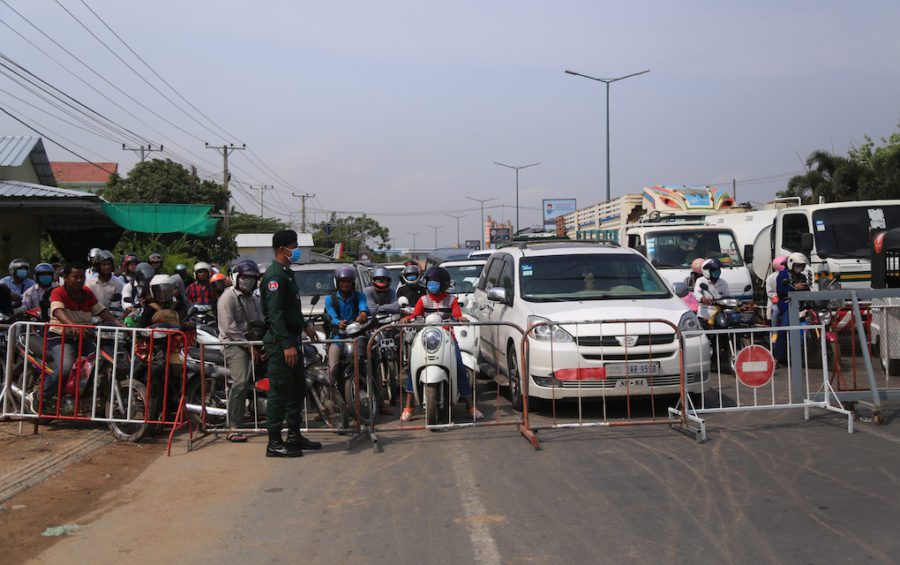UPDATED 10 p.m. — Travel between provinces has been banned for two weeks from Wednesday through April 20, spanning the Khmer New Year holidays amid the country’s worst Covid-19 outbreak to date, the government announced in a statement late Tuesday.
In a statement signed by Prime Minister Hun Sen and posted to his Facebook page, the government said travel between provinces was prohibited aside from goods transport, the armed forces and some other exceptions.
Phnom Penh and Kandal province would be considered as one area, allowing travel between them, the statement said.
Tourist sites would also be closed for the two-week duration, the statement said, without listing specific locations.
The travel ban came as measures to prevent the spread of Covid-19 expanded to several provinces ahead of the new year holidays next week.
The government last month decided to continue with the holidays despite the ongoing outbreak, and the Health Ministry last week allowed pagoda visits and “necessary” travel during Khmer New Year period. But Phnom Penh this week announced an additional ban on gatherings except within households, while Kampong Chhnang said all arrivals to the province would need to quarantine for two weeks.
On Tuesday, the provincial administrations of Svay Rieng and Kampong Cham also announced tighter restrictions on travel and nighttime activities.
In a statement, the Svay Rieng provincial administration said that for 12 days between Wednesday and April 18, people are not allowed to travel outside their residences except for work, buying food and other necessary activities.
Gatherings are also restricted to households, workplaces and other exceptions allowed by authorities.
Only emergency services and food supply services would be allowed into casinos along the Vietnamese border in Bavet city, it added.
Kampong Cham’s restrictions last for two weeks from Thursday to April 21, and order businesses such as restaurants, food stores, malls and marts to close from 8 p.m. to 5 a.m. Gatherings are also banned at night except within households and funerals with a limited number of attendees.
The restrictions come as three people in Phnom Penh were arrested on Sunday for drinking and singing together indoors in an alleged breach of Covid-19 measures, which include mandatory social distancing in the capital.
New York-based Human Rights Watch, which previously criticized the country’s newly passed Covid-19 Law as “draconian,” on Tuesday also raised concerns over the Telecommunications Ministry’s QR code-based tracking system, which has become widespread among Phnom Penh businesses.
The Telecommunications Ministry did not answer the group’s questions about what personal data the government was collecting, it said in a statement.
“Cambodia’s QR code system is ripe for rights abuses because it lacks privacy protections for personal data,” said Phil Robertson, Human Rights Watch’s deputy Asia director. “These concerns are heightened by the government’s stepped-up online surveillance of Cambodians since the outset of the pandemic, putting government critics and activists at greater risk.”
Several provincial authorities are using the system at provincial border crossing points, while some business owners are strictly enforcing the QR code system “out of fear of being deemed non-compliant with government-imposed measures,” Human Rights Watch said.
“Creating a log of people’s locations reveals sensitive insights about their identity, location, behavior, associations, and activities that infringe on the right to privacy, adding to the government’s existing intrusive surveillance practices,” the statement said.
Also on Tuesday, the Health Ministry called on Phnom Penh and provincial governors to prepare medical teams to treat Covid-19 patients in their homes in case of a sudden rise in cases that overwhelms hospitals.
Ministry spokesperson Or Vandine said she had no details about how many doctors were needed.
“[We] will organize based on our technical standards,” Vandine said.
The ministry’s call followed a voice message issued by Prime Minister Hun Sen on Monday suggesting the measure.
Hun Sen said treating patients at home could become necessary if the current outbreak did not abate.
In addition to the treatment, Hun Sen recommended a 20,000 riel daily stipend for families in home quarantine, or about $5.
Updated at 10 p.m. with the government’s travel ban.













